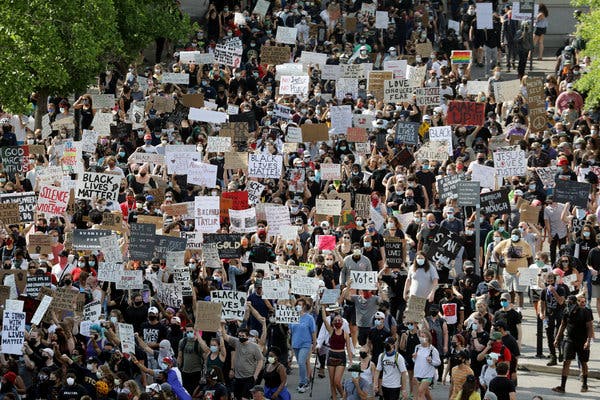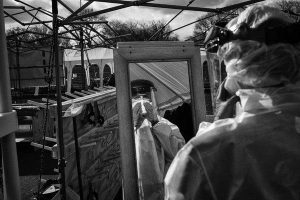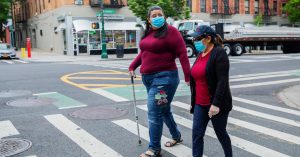NASHVILLE — In real life, Nya Collins, Jade Fuller, Kennedy Green, Emma Rose Smith, Mikayla Smith and Zee Thomas had never met as group when they came together on Twitter to organize a youth march against police violence. It was unseasonably hot, even for Middle Tennessee, with rain predicted, and earlier protests here had ended in violence, with the Metro Nashville Courthouse and City Hall in flames. Collectively, these are not the most promising conditions for gathering a big crowd, much less a calm one. But the teenagers were determined to press on, even if hardly anyone showed up.
On June 4, five days later, the founding members of Teens for Equality — as the young women, ages 14 to 16, call their organization — were leading a march of protesters some 10,000 strong, according to police estimates. “I was astonished,” Kennedy Green, 14, told me in a phone interview last week. “I did not know there were that many people in Nashville who actually see a problem with the system. I was like, ‘Oh, my gosh, there are so many people here who actually care.’”
The protesters, most in their teens and 20s, chanted “Black lives matter” and “No justice, no peace” and “Not one more” as they marched for more than five hours. There was not one hint of disarray in their ranks, no angry confrontations with National Guardsmen or police officers clad in riot gear.
“As teens, we are desensitized to death because we see videos of black people being killed in broad daylight circulating on social media platforms,” said Zee Thomas, 15, in a speech that opened the march. “As teens, we feel like we cannot make a difference in this world, but we must.”
They already have. The march they organized — with advice from the local chapter of Black Lives Matter — was one of the largest protests against white supremacy in Nashville history. Mayor John Cooper has responded to the protests by announcing that Nashville police officers will begin wearing body cameras next month. The cameras have been long planned and also long delayed, despite strong public support amid an increasingly frayed relationship between the police department and many of the communities they serve.
When these Teens for Equality look around them, what they see is the strength in their numbers and the power of their own voices. Those of us who are long past our own teen years have watched powerful social movements rise and fall. We have seen hard-earned social change walked back by new leaders. We might be forgiven our despair that anything in this magnificent, damaged country will ever change.
But the protests that have risen up in the wake of George Floyd’s killing show every sign of being different. Across the country they have continued unabated, bringing change astonishingly quickly. Readers in large numbers are moving to educate themselves about systemic racism — in just a few weeks demand for books about the topic has surged. White Americans are finally taking a hard look at policing practices in their communities and changing their opinion about the Black Lives Matter movement. Police departments are taking a hard look at themselves, too, banning chokeholds and other life-threatening methods of restraint. This time, “a glorious poetic rage,” as the Minneapolis author and activist Junauda Petrus-Nasah put it, is finally changing the country for good.
The recent protests, Kennedy Green says, have turned her into an optimist: “I mean, when have all 50 states ever done anything together? And all 50 states have marched because of the death of George Floyd and for the Black Lives Matter movement. I do believe in the future because there are a lot of kids who are changing the future, trying to end white supremacy and hatred and racism in America.”
This optimism is founded in more than one hugely successful march. It’s also founded in data: New polling shows that 80 percent, or more, of American adults between the ages of 18 and 29 support Black Lives Matter.
Nya Collins, Jade Fuller, Kennedy Green, Emma Rose Smith, Mikayla Smith and Zee Thomas are not alone. They belong to a long tradition of youth activists that includes the Children’s Crusade of the American civil rights movement; the antiwar activists of the Vietnam era; the Pakistani women’s education activist Malala Yousafzai; the gun control activists Emma González, David Hogg and other survivors of the massacre at Marjory Stoneman Douglas High School in Parkland, Fla.; the Indigenous Canadian clean-water activist Autumn Peltier and the Swedish climate activist Greta Thunberg, just for starters.
These young people are passionate about their causes and unwavering in their commitment to change. The world they have inherited is deeply troubled and desperately flawed, and they see with clear eyes both the errors of earlier generations and the hope of their own. Their power lies in the undeniable moral authority of youth: They did not cause the mess they have inherited, but they are rolling up their sleeves to clean it up.
Above all, they are brave, enduring withering attacks by craven adults who hold no scruple against threatening children. You may argue that these activists are simply too young to understand the risks they are taking, but I think they know exactly what they are doing. What they are too young for is cynicism. What they are too young for is defeat.
They are young enough to imagine a better future, to have faith in their own power to change the world for good. And that faith should give the rest of us more hope than we have had in years.
Margaret Renkl is a contributing opinion writer who covers flora, fauna, politics and culture in the American South. She is the author of the book “Late Migrations: A Natural History of Love and Loss.”
The Times is committed to publishing a diversity of letters to the editor. We’d like to hear what you think about this or any of our articles. Here are some tips. And here’s our email: [email protected].
Follow The New York Times Opinion section on Facebook, Twitter (@NYTopinion) and Instagram.



















